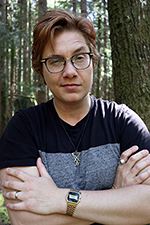 Malahat Review Fiction Board intern Mieke deVries talks with the spring issue #214 contributor about endings vs. beginnings, empowerment in digging into the darkness, and new things growing from the decay of the old.
Malahat Review Fiction Board intern Mieke deVries talks with the spring issue #214 contributor about endings vs. beginnings, empowerment in digging into the darkness, and new things growing from the decay of the old.
MdV: What was the inspiration for this story? How did the story come into the shape we see it in now? Did it change much as you revised it?
AW: My first inspiration was the strong impulse to describe my own trans experience. The story isn’t autobiographical, but it’s hugely informed by my own life. I think the more trans people tell their own stories, the more nuanced our understanding of trans identity, insight, and power will become. Lack of representation leads to flattened, reduced narratives about marginalized voices instead of by them. I mostly wanted to tell a story about being me.
My other inspiration was the play Peer Gynt by Henrik Ibsen. It tells the story of a man deemed unfit for heaven or hell because he’s failed to distinguish himself as either good or evil. He’s done some good, but just enough to cancel out his bad deeds. He’s essentially a wasted man, and must be thrown back in the cosmic “button-mould” to be recycled into something more worthwhile. Ibsen’s 1867 play is a searing indictment of the “modern” man who aims for mediocrity, more concerned with what he can get away with than how he can serve his purpose.
My story, written in 2020, is about failing as a man in a different way. As a trans man, I have often felt like a failure and wished I could go back in the mould and be melted down for another try. My main character is a trans man who feels broken and incomplete, and because of that feeling, remains that way. Only when he is able to embrace his own imperfections and see himself as sacred—no messier or less divine than any other being—is he able to escape this endless cycle of failure and pain.
This story came out pretty much the way you see it on the page now. It was sort of hovering in the wings, I think, waiting to be told.
Read the rest of Andar Wärje's interview.